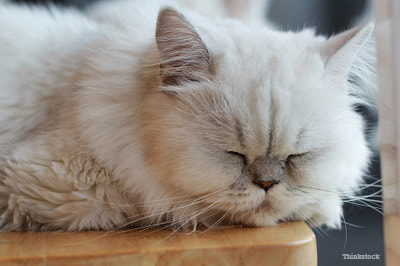|
Posts by: Dr. Nancy Kay, DVM, DACVIM Heart disease in kitties is sneaky business. Without any warning symptoms, it can lay a cat low with life threatening, and sometime even life ending issues. Why is feline heart disease so difficult to detect in its early stages? In part, it has to do with the relatively sedentary lifestyle of cats. This makes it difficult to observe decreased stamina or tolerance for exercise.
The hassle factor Without question, visiting the veterinary clinic is difficult with some cats. There’s the getting the cat into the carrier, listening to yowling while driving, and then trying to restrain an angry critter during the exam. Regardless of this hassle factor, remember that the annual exam is critically important. If you experience difficulties getting your cat to the veterinary hospital, talk with your veterinarian or veterinary technician in advance of the visit. They are bound to have some tricks up their sleeves that will make the whole process less stressful for you and your kitty.
5 Comments
5/1/2022 11:44:58 am
hey, I really like this post and had a fun time reading it. So thank you so much for posting it online on your blog and I am looking forward to more.
Reply
5/15/2022 02:40:34 am
Great tips! We also rely on each other to keep our health in check. Having a buddy really helps us say no to unhealthy cravings most of the time.
Reply
7/23/2022 09:54:25 am
Wow! Excellent. When I'm reading the whole content I feel so smart. Very informative article that helps me a lot. I will share this to my friends and classmates.
Reply
8/14/2022 08:36:55 am
I want to thanks for your time for this wonderful Article!! I definitely enjoying every little bit of it and I have you bookmarked to check out new stuff you blog post.
Reply
Leave a Reply. |
Archives
November 2023
Categories |
|
HELPFUL INFORMATION
Office Hours
Monday: 8AM – 6PM Tuesday: 8AM – 6PM Wednesday: 8AM – 8PM Thursday: 8AM – 8PM Friday: 8AM – 5PM Saturday: 8AM - 12PM Sunday: CLOSED |
LOCATION
AND DIRECTIONS Salem Veterinary Hospital
2159 Lynnhaven Parkway, Suite 105B Virginia Beach, VA 23456 |
CONNECT
WITH US! |
Site powered by Weebly. Managed by IDEXX Laboratories

 RSS Feed
RSS Feed
